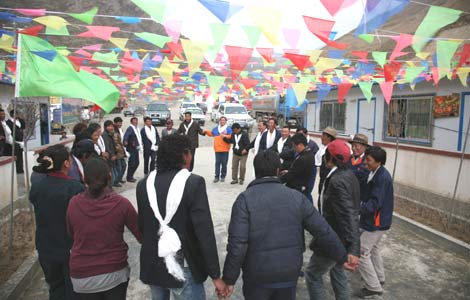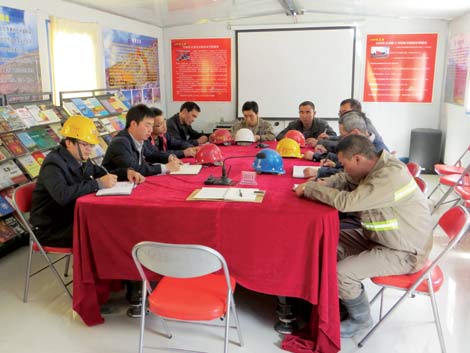|
 |
|
Employees of Huatailong Mining Development Co, a subsidiary of China National Gold Group Corp, celebrating the Tibetan New Year with local people in February. Located in Jiama town, Metrorkongka county, 68 kilometers from the center of Lhasa, the Huatailong mining project benefits not only the local people working with the company but their family members, including the local post-1980 and post-1990 generations. [Photo / China Daily] |
Having bought a house in Lhasa and a brand-new car, Ngawang Tsering, 59, a Tibet resident, said he is grateful for what he owns.
"I don't have any special skills but I earn 2,000 yuan ($317) a month by being an entrance guard at the mine," said the employee of Huatailong Mining Development Co, a subsidiary company of China National Gold Group Corp. "My life has changed so much for the better since the mining company arrived."
|
 |
|
Ngawang Tsering, 59, Tibet resident,working with Huatailong Mining Development Co, a subsidiary company of China National Gold Group Corp |
He said there are seven people in his family and they all had a nomadic life before with an annual income of a mere 20,000 yuan. Now his son earns 5,000 yuan a month as a truck driver at Huatailong's mining project in Jiama town, Metrorkongka county, 68 kilometers from the center of Lhasa, the capital city of the Tibet autonomous region
Many local people like Ngawang Tsering see the exploration and development of the region's resources benefiting not only themselves but their family members, including the local post-1980 and post-1990 generations.
Tsering Dekyi, 24, said she feels lucky to be working at Huatailong Mining after graduating.
"There are five people in my family and only my dad made money before I got the job at the company," she said. "I went to Jiangsu province to go to middle school and Tianjin for my high school. Because we were poor, my brother and I could not both go to college."
She decided to let her younger brother go to college instead of her.
However, after she worked as an intern at Huatailong Mining, the company decided to send her to Shenyang in Liaoning province to study at the Northeastern University, majoring in mining engineering.
"State-owned companies have brought not only economic growth for Tibet, but also the opportunities for local young people to benefit economically and academically," said Tsering Dekyi. "This is a great contribution."
She said that the mining industry in Tibet is essential for national economic growth and she is keen to see every single ore mined here fully used for the economy.
|
 |
|
Staff members of Huatailong Mining Development Co, a subsidiary of China National Gold Group Corp, discussing their mining plans at Jiama at an altitude of about 5,000 meters. [Photo / China Daily] |
So far, Huatailong Mining has financed nine local young people to go to college in inland areas. It also donated 740,000 yuan to improve local people's daily lives and 550,000 yuan to local students in the autonomous region.
To counter poverty and improve local employment, the company hired 191 locals in Tibet. There are 214 staff employees from non-Han ethnic groups, which account for 35 percent of the company's staff, the highest percentage among mining companies in China.
Before China Gold came to Jiama, there used to be many small-scale private miners. Some locals made a living by driving trucks for a transport business but because they were not well managed disputes often broke out.
In December 2009, China Gold invested 16 million yuan in purchasing the transport team and formed Jiama Industrial and Trading Co, composed of all 655 families with 3,850 local people in Jiama. Everyone has received a year-end bonus since 2009.
Apart from two people, all the managers, drivers and staff members in the trading company are locals. Their average salaries can reach as high as 4,000 yuan a month.
Lukhang Yeshe, a 29-year-old local who works at the company, told China Daily that many employees at the company had bought their own cars after one or two years of working.
"At the beginning, many people were against the mining projects in Jiama, believing exploring the mines was not respectful to the spirits," he said. "The situation has changed now. Most graduates in Lhasa want to work at the mine, considering it to be a good job."
